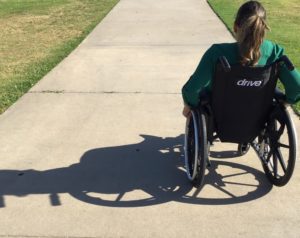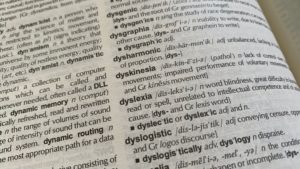Disabled Students’ Allowance (DSA) is a non-repayable grant available to students with disabilities, health problems and learning difficulties which is provided with the aim to aid students in the areas of which their studies are affected. It can be tricky to know who specifically is eligible for DSA as there are many factors to be considered when starting the application process. Today I will be outlining the list of disabilities and difficulties which hinder students’ learning and thus are eligible to receive funding from DSA, to make sure that eligible students are taking advantage of all the help they can get!
The Government website outlines that in order to be eligible for DSA, you must be living in either England, Wales, Scotland or Northern Ireland and have a “disability that affects your ability to study”.
This includes the following:
A Specific Learning Difficulty
This relates to a diagnosis which directly impacts your brain function and learning. These difficulties may impact memor function, organisation abilities, reading/writing abilities and sensory function.
Specific learning difficulties (SpLDs) include:
- Dyslexia
- ADHD
- Dyspraxia
- Dyscalculia
- Dysgraphia
- Auditory Processing Disorder
- Language Processing Disorder
- Nonverbal Learning Difficulties
- Visual preceptor/visual motor difficulties
What forms of DSA can I be offered with a specific learning difficulty?
Students with specific learning difficulties such as dyslexia can expect to be offered forms of DSA such as specific computer equipment tailored to meeting their individual needs, as well as specialised software and programme subscriptions for targeted support. DSA can also be provided in the form of a specialist note-taker, study skills mentor and non-medical helper.
A Mental Health Condition
Every person has their own mental health. Some people will experience episodes of poor mental health, however in order to claim DSA in relation to one’s mental health, the student needs to have a diagnosed mental health condition, such as one of the following, which is directly impacting their learning ability.
- Generalised Anxiety Disorder
- Panic Disorder
- Social Anxiety Disorder
- Separation Anxiety Disorder
- Claustrophobia
- Agoraphobia
- Depression
- Post-Traumatic Stress Disorder (PTSD)
- Bipolar Disorder
- Borderline Personality Disorder (BPD or EUPD)
- Obsessive Compulsive Disorder (OCD)
- Schizophrenia
- Eating Disorders
- Disruptive behaviour and dissocial disorders
- Neurological and Developmental disorders such as Autism Spectrum Disorder (ASD) and Attention Deficit Disorder (ADD)
 What forms of DSA can I be offered with a mental health condition?
What forms of DSA can I be offered with a mental health condition?
The forms of DSA which Students with mental health conditions are offered varies depending on their diagnosis. Predominantly offers include things like assistive technology and note-taking software such as a Jamworks Pro subscription to help reduce stress levels during lectures as students can rest assured that they are not missing out on any important content. Other offers can include programmes and devices such as a printer to enable students to work from home during periods of illness as a result of their disability.
A Physical Disability
Students who suffer with a physical disability are eligible to apply for DSA. A physical disability will affect a person’s body function or ability to carry out day-to-day activities. These can include:
- Loss of limbs
- Limited mobility
- Arthritis
- Cerebral Palsy
- Spinal Cord Injuries
- Dwarfism
- Muscular difficulties
- Spina Bifida
- Cystic Fibrosis
- Multiple Sclerosis
- Any requirement for the use of crutches/wheelchair
 What forms of DSA can I be offered with a physical disability?
What forms of DSA can I be offered with a physical disability?
For a physical disability, students can expect to be offered financial support for things such as travel if required due to inability to walk to classes, as well as equipment to aid their physical impairments. Support can be offered in the form of a carer, assistive technology and software, mobility aids, transcriber and so on.
Sensory Disability
A sensory disability affects a student’s ability to study in response to one or more of their senses lacking function.
- Visually impaired (partial or blindness)
- Deaf or have a hearing impairment
- Sensory Processing Disorder
- Autism Spectrum Disorder (ASD)
 What forms of DSA can I be offered with a sensory disability?
What forms of DSA can I be offered with a sensory disability?
Students with a sensory disability can expect to be offered forms of DSA such as a BSL interpreter, note-taker, assistive software, recording device, speech dictation software, special keyboards or non-medical helper.
Long-term health condition
Students with long -term health conditions can struggle with their learning experience due to unexpected health setbacks. Conditions which are eligible for students to apply for DSA include:
- Cancer
- Chronic heart disease
- HIV
- Epilepsy
- Tourette’s Syndrome
- Chronic Migraines
- A Chronic Illness that impairs your ability to study
- Asthma
- Diabetes
- Autoimmune Disorders
- Crohn’s Disease
- Irritable Bowel Disease
 What forms of DSA can I be offered with a long-term health condition?
What forms of DSA can I be offered with a long-term health condition?
A needs assessment appointment will be extremely beneficial for students with long term health conditions as they will be able to gain an understanding of the type of individual support they will require alongside their time at university. Students can expect to be offered support such as non-medical helpers, assistive technology such as computers and printers, as well as lecture recording software and revision quizzes such as Jamworks.
What difficulties and diagnoses are ineligible for DSA?
Unfortunately, any disabilities and diagnoses which do not directly impact a student’s learning will not be considered as proof of eligibility for DSA support. This includes disability-related costs for devices and equipment which would be required regardless of whether a person was a student or not.
 How can I provide evidence of my eligibility?
How can I provide evidence of my eligibility?
You can provide evidence of your eligibility when completing your DSA application either through your Student Finance account or by completing the DSA1 form. Evidence to support your eligibility which you should submit includes :
– A doctor’s letter
– Psychiatrist review
– Medical form confirming diagnosis
– Letter of confirmation from relevant medical professional
If you do not have access to any of these documents, it is recommended to send your application to your trusted medical professional who has confirmed your diagnosis so that they can provide your evidence directly.
What should I do if my application for DSA is denied?
If your DSA application is denied, do not panic. Firstly, it is important to discover the reason why the application was denied. If it was denied due to lack of evidence, go to the step above and obtain further documentation. If your application was denied due to an understanding that your disability will not impact your learning, you may be able to appeal this decision by calling the DSA team via this email: dsa_team@slc.co.uk.
Make sure to review your answers on your DSA form to ensure you have provided all the correct information. Finally, I recommend speaking with your university’s Disability Assistance team to voice your concerns. If the final decision is that your application for DSA is denied, they will be able to put you in the right direction of the next possible course of help and assistance for your studies, as well as possibly setting you up with a learning agreement so that your lecturers are aware of your conditions.
There are a wide range of disabilities and learning difficulties which students may have that make them eligible for DSA support. Therefore, it is important to be aware of what forms are available for each student’s individual needs to make sure you are getting the best chance to succeed at university.
You can get started with Jamworks today to aid your studies and build better grades! – Click here for more!


